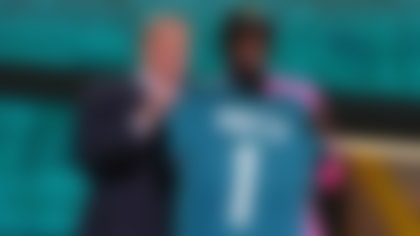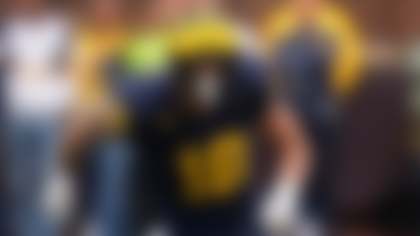Maybe we should have seen this coming.
In retrospect, after the 269th and final game of a surreal season in which none of those games were promised, it was wrong to assume that a world turned upside down could alter the mighty arc of a football inevitability.
Late Sunday night, living legend and Super Bowl LV Most Valuable Player Tom Brady stood on the podium at Raymond James Stadium, amid a sea of confetti covering the Tampa Bay Buccaneers' home field, and rhetorically asked his teammates, "I think we all knew this was gonna happen tonight, didn't we?"
The 43-year-old quarterback, having just won his seventh championship in emphatic fashion, was ostensibly being interviewed by CBS broadcaster Jim Nantz -- but in that moment, he was speaking to all of us.
Though the Buccaneers went into Super Bowl LV as underdogs, as they had been in each of their previous two playoff games, Brady and his teammates evidently expected to be hoisting the Lombardi Trophy at night's end. Whether they envisioned a victory of this scope -- a 31-9 bludgeoning of the defending champion Kansas City Chiefs and their young supernova of a quarterback, Patrick Mahomes -- wasn't entirely clear.
Years from now, when COVID-19 is hopefully long removed from global-pandemic status and football fans marvel at the fact that the 2020 NFL season was completed on schedule and in its entirety, Brady's premonition will probably make a lot more sense.
Know this: It was never going to be easy. When Brady, after electing to end a two-decade run of brilliance with the New England Patriots, made the fateful decision to sign with the Bucs, it created a challenging set of circumstances, even for a leader and competitor of his magnitude. Adjusting to a new offense with new terminology and new teammates would be tricky. When the pandemic wiped out the offseason, and the preseason games, and made day-to-day functioning a taxing endeavor for everyone concerned, Brady's degree of difficulty grew exponentially.
Predictably, Brady and the Buccaneers took a while to gel. In late November at Raymond James Stadium, they fell behind early to the Chiefs, suffered a 27-24 defeat and dropped to 7-5 heading into their bye week. After that, their margin for error was hauntingly small.
And what happened? The Bucs rallied to win eight games in a row, including three road playoff triumphs -- and then proceeded to blow Kansas City off their home field on both sides of the ball. And Brady, the greatest winner in the history of the sport, celebrated under the confetti as if it were his birthright.
How did we get here? How did we even start? Let's go back to Sept. 9, the day before the Chiefs would open the season against the Houston Texans. On that afternoon, I texted Kansas City coach Andy Reid to get his thoughts.
"I'm glad we are getting started," Reid replied. "A month or two ago I wasn't sure we would have a chance."
He wasn't alone: Virtually every coach, general manager, owner and player I talked to in the months leading up to that Thursday night opener expressed similar skepticism. With COVID-19 raging out of control, not to mention the national unrest in the wake of George Floyd's murder (and the resulting protests against police brutality and racial injustice), nothing about the 2020 season seemed like a given.
On that Thursday night in Kansas City, players and coaches from both teams -- including Mahomes and the Texans' young star quarterback, Deshaun Watson -- linked arms at midfield for a moment of racial unity. Some of the fans at Arrowhead Stadium booed, setting a disquieting tone for the start of a marathon with an uncertain finish line.
There were plenty of roadblocks, but somehow the games went on. Postponements happened, and stars were sidelined by the virus (whether actually ill or exposed to others who were), but none of the contingency plans that would have extended the regular season ended up having to be implemented. And by Thanksgiving, it was apparent that despite the horrific toll the pandemic was taking on the nation, many of us had much for which to be grateful.
In late November, the Denver Broncos were forced to use Kendall Hinton -- a practice squad wide receiver who'd had no preparation during the week -- at quarterback in a game against the New Orleans Saints, with predictable results. A week later, the San Francisco 49ers were abruptly relocated to Arizona after their home county ordered a shutdown amid rising COVID-19 rates.
In January, the Cleveland Browns played their first postseason game in 18 years -- without first-year coach Kevin Stefanski, who along with some of his staff members missed the game while in the COVID-19 protocol. With special teams coach Mike Priefer running the show, and Stefanski -- who'd later be honored as the NFL's Coach of the Year -- watching from his basement, the Browns went to Pittsburgh and stunned the rival Steelers.
Going into the season, there was a sense that owners might give coaches and general managers some leeway, given the obvious challenges confronting them in 2020. That illusion was shattered in early October when the Texans fired coach and general manager Bill O'Brien, who was coming off a season that ended in a Divisional Round playoff defeat to the Chiefs. Two other coaches were dismissed by November's end; five general managers were gone by Christmas.
In January, the firing and hiring cycle proceeded in familiar fashion, signaling to me and others that systemic racism remains a significant obstacle, and that we've still got a long way to go.
Upheaval was a common theme during this most unusual campaign. Shortly before the start of the season, I sat outside with Los Angeles Rams quarterback Jared Goff in his Calabasas, California, backyard, and he talked about the new edge he possessed as he headed into his fifth NFL campaign.
Fewer than five months later, Goff -- who'd won a road playoff game against the Seattle Seahawks on zero reps 12 days after thumb surgery -- was traded to the Lions as part of a blockbuster deal involving Detroit counterpart Matthew Stafford, setting off what will likely be a wild offseason heading into the 2021 campaign. That may well include a deal involving Watson, who has asked the Texans to trade him following some dubious organizational maneuverings in the wake of their disappointing 2020 showing.
In the end, the one constant of this unique campaign was Brady coming up big when it mattered most. The Bucs were surprisingly tested in their first-round playoff game against the Washington Football Team (rechristened in the wake of Floyd's death and ensuing protests), pulling out a 31-23 victory against an unknown quarterback (Taylor Heinicke) making his first NFL start.
The hard-fought defeat capped a remarkable season for Washington coach Ron Rivera, hired after a nine-season run with the Carolina Panthers. After taking over a team that had gone 3-13 in 2019, Rivera dealt with, among other things: organizational dysfunction (including a sexual-harassment scandal and legal battles between owners), a revolving door at the quarterback position (including Comeback Player of the Year winner Alex Smith's inspirational return) and the challenges presented by the pandemic.
Oh, and he also battled cancer, fighting through treatments that sapped his energy and made it exceptionally hard to do his job -- only to lead Washington to the NFC East title in the 256th and final game of the regular season.
In late January, Rivera and his family rejoiced upon learning that he was cancer-free. Alas, as with COVID-19, cancer is a horrible disease that ravages so many families -- our NFL Media group among them. As GameDay Morning host Rich Eisen stated so eloquently Sunday, we are gutted by the loss of our colleague Chris Wesseling, and our thoughts are with his wife, Lakisha (another one of our colleagues), their son, Linc, and all of his loved ones. And those thoughts will live on, long past this emotionally jarring season.
After that first-round victory in the nation's capital, Brady and the Bucs proceeded to win playoff games against a pair of fellow future first-ballot Hall of Famers: the Saints' Drew Brees, who is expected to retire this offseason, and the Green Bay Packers' Aaron Rodgers, who had fought through an offseason of uncertainty, realized mental and emotional peace and put together a stellar regular season that would earn him his third MVP award.
In the NFC Championship Game at Lambeau Field, Rodgers fell short, then spoke of an "uncertain future." Brady, meanwhile, advanced to his 10th Super Bowl, in search of his fifth Super Bowl MVP.
And once that happened, in Brady's mind, hoisting that Lombardi once more was a certainty.
As Brady and his teammates burnished their confidence and prepared for the game, Reid and the Chiefs experienced another emotionally jarring jolt. Reid's son Britt, Kansas City's outside linebackers coach, was involved in a multi-vehicle crash that left a 5-year-old with life-threatening injuries. Britt Reid, who was also hospitalized, did not travel to Tampa with the team and did not coach on Sunday. He is reportedly being investigated for driving while intoxicated; the 5-year old girl, as of Sunday, reportedly remained in critical condition -- and all of us in the NFL community pray for her recovery.
Under that chilling backdrop, Andy Reid watched his team get manhandled by the Bucs on both sides of the ball, rendering the Chiefs' normally prolific offense impotent, and underscoring the absence of four of the team's projected offensive line starters (including one, Laurent Duvernay-Tardif, a medical-school graduate who opted out to work on the frontlines treating COVID-19 patients in Montreal) heading into the 2020 campaign.
Not that Brady necessarily needed it, but the football gods -- as they so often seem to be -- were squarely on his side.
In the first half, while the game was still competitive, the Chiefs were penalized eight times for 95 yards -- the highest yardage total ever absorbed by a team in any Super Bowl half -- while the Bucs were flagged just once, for 5 yards. It evoked memories of the 2017 AFC Championship Game, when Brady's Patriots incurred just one flag (holding on a kickoff), while the Jacksonville Jaguars had six penalties for 98 yards ... or the 2011 AFC title bout, when the Pats had one penalty to the Baltimore Ravens' six. But we digress ...
Sunday's calls and non-calls can be debated in the coming months, yet that argument will largely be drowned out by the obvious physicality and precision with which the Bucs dismantled the Chiefs.
Let's be clear: By the end of this surreal season, the Buccaneers were the best team in football, and their Lombardi was earned and deserved. That the quarterback raising the trophy for the seventh time seemed to know this was coming, and that he made it very clear on that podium he intends to return for a potential encore, was the lasting impression of a uniquely challenging season that ended with a calmingly familiar image.
As Brady told Nantz -- and tens of millions of viewers -- on that podium: "We ended up playing our best game of the year."
That they did, and as they celebrate and decompress, let's all give Brady and the Bucs their due -- and let their collective triumph stand as an exclamation point on a season that was never promised.
Follow Michael Silver on Twitter.












